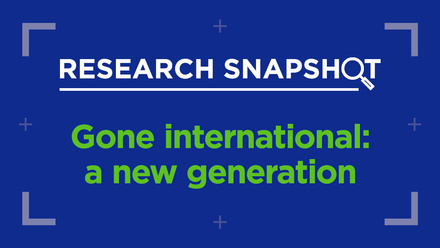Balancing employability with ‘employer-ability’

Globally, the discourse on employment of international students and graduates in their host countries centres around the term ‘employability’. This implies that employment is the responsibility of the individual student or graduate and that they need to develop their employability to secure, and succeed in, employment. This will then benefit themselves and the employers, as well as the local workforce, community and economy.
Interestingly, the employability narrative places all the responsibility on the individual, although clearly many stakeholders benefit from it. Maybe it is time to balance out the power relations in this narrative, by bringing out the concept of ‘employer-ability’ and starting to discuss what that might be, as well as mapping out the stakeholders of it?
Employability
Employability, as defined by Mantz Yorke, in his 2006 guide ‘Employability in higher education: what it is – what it is not’, is:
"a set of achievements – skills, understandings and personal attributes – that makes graduates more likely to gain employment and be successful in their chosen occupations, which benefits themselves, the workforce, the community and the economy."
This definition indicates that it is entirely up to the individual to benefit not only themselves (and presumably their employers), but also the workforce, the community and the economy. It makes me wonder what the responsibility of the other benefitting stakeholders might be. Higher education institutions (HEIs) are often considered responsible for developing their students’ and graduates’ employability, eg through curriculum, career support and connections to employers. But as employability is a set of personal attributes, the responsibility for developing them must lie with the individuals – not with the HEIs. What HEIs can, and should, do is to provide the suitable learning opportunities for this development to occur and the support for the self-reflection it requires.
Employer-ability
If employment equals sufficient employability, then all the responsibility lies within the individual. This is not fair, realistic or sustainable. Employment, and the responsibility for it, must go beyond individual employability and be balanced with employer-ability.
Employment, and the responsibility for it, must go beyond individual employability and be balanced with employer-ability
‘Employer-ability’ has never been defined as a term. In other terms this might be referred to as eg employer willingness, ability, capability and readiness to employ international talents. As with students, the development of these employer attributes does not happen all on its own, but requires suitable environments and support. The term ‘employer-ability’ was suggested by Louise Morley in her 2001 publication ‘Producing new workers: quality, equality and employability in higher education’, and has since been mentioned a few times by other authors:
"Perhaps we should develop the concept of employer-ability to balance out the power relations embedded in the employability discourse of recruitment and retention. The implication is that the education process should also extend to employers. They need to be more sensitised to issues pertaining to differences of gender, race, social class, disability and sexual orientation. Only then will the same employability attributes have similar economic and professional values for different social groups."
But what would this concept entail and who would educate the employers on it? HEIs and continuous learning quickly comes to mind when thinking about education and work life. HEIs also have a lot to gain from increased employer-ability of local companies in attracting, recruiting, onboarding and retaining international students and graduates. However, traditionally HEIs have focused on educating students, not employers. Is it time to change the way we think about, and talk about, this matter?
Micro and small companies need external support
Most research on managing skilled migrants (ie those with at least a Bachelor’s degree) has been done in multinational enterprises, which usually have sufficient internal resources to carry out Strategic Human Resource Management (SHRM) on their own. However, in 2019, 98.9% of all private companies in the EU were micro and small enterprises (MSEs), ie companies with fewer than 50 employees. These companies employed 64.4% of the workforce in the EU. MSEs often lack the internal resources and HR know-how for attracting and retaining international talent, including students and graduates. This then raises the question of whether they could rely on external support for these processes, who would provide what kind of support, and at what cost?
Free online training module in employer-ability
In the INTERLOCALITY project (Increased Local Employability of International Degree Students), we are addressing both employability and employer-ability, based on existing literature and research we have done as part of the project. One part of the project has focused on developing free online learning modules for staff at SMEs, HEIs and third sector organisations, to enhance their ability to support both the employability of the students and the employer-ability of the organisations.
Traditionally HEIs have focused on educating students, not employers. Is it time for a change?
The online learning modules are: 1. Intercultural Sensitivity, 2. Guidance and Counselling, and 3. Employer-ability. At the end of the project in February 2025, all modules will be available openly to any HEI who wants to offer them. The aim is that the HEI invites local employers and third sector actors to take these courses to strengthen the collaboration around local employment of international students and graduates. The employer-ability module contains three levels. The first level is about the societal need for international talent, the differences between employability and employer-ability, and the potential stakeholders involved. The second level is general knowledge around attracting, recruiting, onboarding and retaining international talent. This might be new and valuable both for smaller companies and for HEI and third sector staff members. It also enables a shared language and understanding of the other stakeholders’ perspectives. The third level contains practical tools for staff directly involved in the recruitment and onboarding of international talent.
The online learning module on employer-ability is just one example of how HEIs can move beyond enhancing the employability of the students and graduates, to also play an active part in enhancing the employer-ability of local organisations (including their own). It is important that the current employability narrative can be discussed critically, and the power imbalances in it addressed openly. HEIs have thus far played a significant role in upholding the employability narrative, but could have much to gain from moving it more towards employers and other stakeholders. However, this means identifying new roles and responsibilities in the development of employer-ability.
Employability & employer-ability: connecting the two currents
If you would like to know more about the concept of employer-ability and the online learning modules for staff, please come and meet us at the 2023 EAIE Conference and Exhibition in Rotterdam. We will be presenting our poster ‘Employability & employer-ability: connecting the two currents’ (poster session 313) on Thursday 28 September at 14.30−16.00. We hope to see you there!






